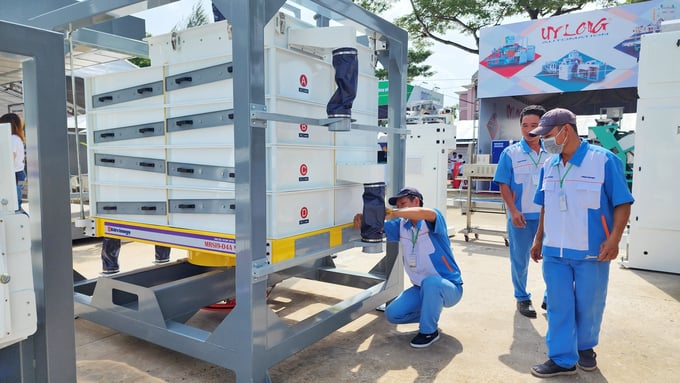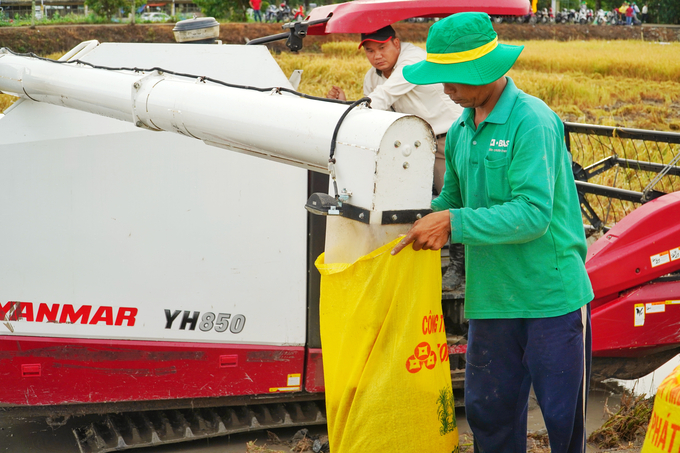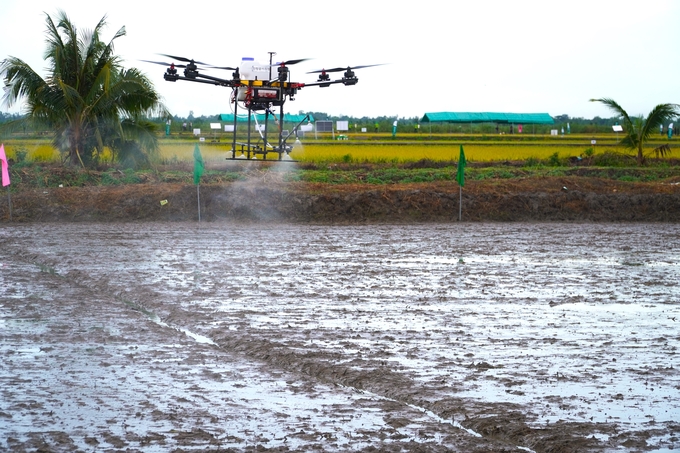November 27, 2025 | 18:54 GMT +7
November 27, 2025 | 18:54 GMT +7
Hotline: 0913.378.918
November 27, 2025 | 18:54 GMT +7
Hotline: 0913.378.918
The Mekong Delta is one of the key agricultural production areas of the country. Based on restructuring the agricultural sector to 2025, on July 20, 2022, the Prime Minister issued Decision 858/QD-TTg approving the Strategy for the development of mechanization of agriculture and agro-forestry-fishery processing until 2030. This strategy clearly states that the development of agricultural mechanization and agro-forestry-fishery processing is the task of the agricultural sector. It also includes enhancing value, sustainable development, and international economic integration.
Since 2019, the equipping of engines and agricultural machines in the Mekong Delta has increased significantly compared to 2011. Specifically, the number of tractors increased by 48%, combine harvesters by 79%, and agricultural dryers by 29%. Currently, the level of motivation equipment in the Mekong Delta is the highest in the country, but only at 2.8 CV/ha. The percentage of households with tractors and agricultural machines is still low, with about a tractor per 50 households on average. This level of equipment is still low compared to countries like Thailand, Korea, and China,...
According to Mr. Nguyen The Ha, Advisor of Bui Van Ngo Agricultural Engineering Company (Bui Van Ngo Company), currently, the agricultural land area of our country is about 20 million ha. We have exploited 10 million ha. For the equipment level to reach 4CV/ha over this 10 million ha of agricultural land by 2035, we need 40 million CV of agricultural machines in cultivation.
Currently, agricultural machines manufactured in Vietnam only account for 20-30% of the market. Most of the machinery is imported from China, Japan, Korea... Therefore, the state requires that the domestic mechanical sector must produce enough agricultural machines to serve farming and industrial equipment systems for processing agro-products. The sector needs to meet these criteria: adaptable, effective, and modern. Consequently, gradually mechanize agriculture and modernize the processing industry along with the capacity and manufacturing level of the domestic mechanical industry.

The machinery products serving the rice processing line of Bui Van Ngo Company have been exported to over 30 countries and territories. Photo: Kim Anh.
Bui Van Ngo is a pioneer mechanical business in the Mekong Delta region producing rice processing products, from drying, storing, and milling Vietnam's rice to international standards. Their products have been exported to over 30 countries and regions, including major markets such as Korea, the USA, Western Europe, and South America,...
The Company's product lines have a capacity of 20 - 1,000 tons/day. It basically solved rice milling, modernized the agricultural industry, and contribute to Vietnam's rice exports.
Mr. Ha analyzed the reality of rice production in Can Tho City, the production cost of a kilogram of rice for farmers was VND3,300/kg. If we applied mechanization in production, the above figure will be VND1,800/kg of rice. In addition, if harvested correctly, farmers can take advantage of straw with a value of over VND1,800/kg. Thus, the cost of rice cultivation will be zero, meaning that farmers will save VND3,300/kg of rice. Similarly, if done well at the post-harvest processing stages through the application of mechanization, the value of rice grains will increase many times over.

If done well at the post-harvest stages through the application of mechanization, it will increase the value of rice grains many times over. Photo: Kim Anh.
Established in 1965, the Faculty of Mechanical Engineering, Nong Lam University - Ho Chi Minh City is the oldest training institution for agricultural engineering technicians in the South. With over 70% of lecturers being trained from countries and regions such as Australia, Taiwan, Korea, Thailand, Czech Republic, USA...
Assoc. Prof. Dr. Nguyen Huy Bich, Dean of the Faculty of Engineering and Technology understands the challenges and requirements for agricultural production development. He said that it is necessary to focus on training human resources for agricultural mechanics from low to high, especially engineers.

Experts said that there should be a policy to strengthen the linkages of the 4 groups to create momentum for the application of mechanization. Photo: Kim Anh.
“In fact, no country has succeeded in mechanization with the import of agricultural machinery. Promoting research and creating policies to develop domestic agricultural machinery manufacturing businesses is a sustainable and autonomous solution in the development of agricultural mechanization”, Assoc. Prof. Dr. Nguyen Huy Bich assessed.
Besides, according to Mr. Bich, the Mekong Delta needs to re-establish a system of agricultural mechanical engineering research and service centers. This will create a workplace for engineers and serve the mechanization of the region. Simultaneously, there need to be policies and regulations on strengthening the linkage of 4 groups (state, farmers, enterprises, and scientists) to develop the agricultural machinery industry. This will create momentum for the application of mechanization and promote sustainable agriculture.
Translated by Hoang Duy

(VAN) According to Mr. Vo Minh Thanh, Director of the Tay Ninh Department of Agriculture and Environment, Resolution 57 has created a new development pathway for the locality, shifting from traditional toward modern agriculture.
/2025/11/26/4909-2-154329_878.jpg)
(VAN) Pearl grouper farming in HDPE cages not only delivers economic efficiency but also contributes to protecting the environment, creating jobs, and promoting marine-based experiential tourism.

(VAN) The model of making a living under the forest canopy through the agroforestry system in Van Son commune, Bac Ninh province, is expected to generate an annual income of approximately VND 30 million/ha.

(VAN) Many enterprises in Can Tho are harnessing natural energy and reducing greenhouse gas emissions in their production processes, thereby contributing to the promotion of a sustainable green transition.
/2025/11/24/3536-2-112800_176.jpg)
(VAN) Dong Nai now has tens of thousands of hectares of forests certified for sustainable management, and this area will continue to be expanded in the coming period.

(VAN) Vinh Ha hamlet (Dai Xuyen commune, Hanoi) is shifting away from small-scale farming as households adopt bioscurity into their breeder chicken models.

(VAN) Heavy rains make aquatic species more vulnerable to disease. Proactive water management and high-tech systems help farmers prevent outbreaks and protect yields.